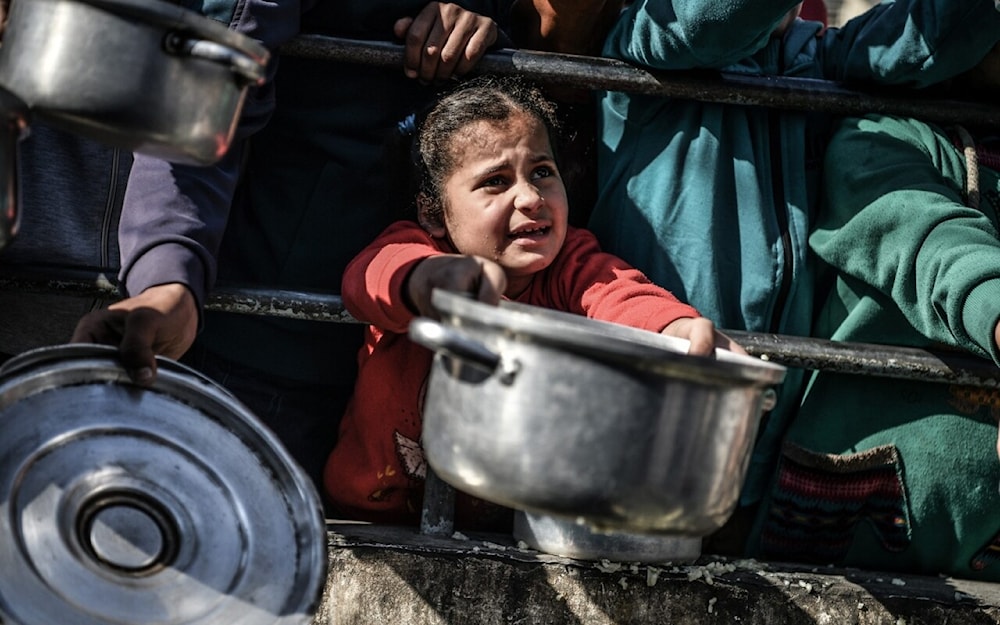Famine in Gaza 'turning children into skeletons': Reports
Even in Yemen and Somalia, never has 100% of the population been food insecure like in Gaza.
-

Shaima, 8-years-old, waits her turn in the crowd to get a meal from a charitable hospice that distributes free food in the city of Rafah, southern Gaza Strip (UNICEF)
According to The Telegraph, the UN has declared that food insecurity is now affecting the whole population of 2.3 million in Gaza, with half a million facing ‘catastrophic conditions’ which means people are experiencing “extreme food gaps and collapse of their livelihood”.
"Israel's" use of starvation as a weapon of war has resulted in an alarming situation where the vast majority of people worldwide experiencing famine are located in Gaza, as indicated by a recent report by the UN-backed Integrated Food Security Phase Classification (IPC), Truthout highlighted.
Humanitarian workers in Gaza have reported that some are going up to 3 days without food.
Naouar Labidi, a senior officer with the World Food Programme (WFP), emphasized the "unique" character of the food security situation, calling it "unprecedented."
Labidi noted that even in Yemen and Somalia, never has 100% of the population been food insecure like in Gaza.
Toddlers and newborns are particularly vulnerable since they rely heavily on food and nourishment to sustain their developing physical and mental abilities. Their growth may be hampered if they do not receive enough nourishment, resulting in irreparable physical and cognitive impairment known as 'stunting'.
With over 135,000 in Gaza under the age of 2, doctors believe a whole generation is now in danger of developing the condition.
Anuradha Narayan, a senior nutrition adviser at Unicef warned that "The brain is such a big part of caloric and nutrient consumption in a child’s development,” meaning the consequences of stunting "are going to last a lifetime."
Dr Nasser Bulbul, head of the Neonatal Intensive Care Unit at Shifa Hospital, told the Telegraph that cases of severe malnutrition were on the increase, emphasizing that with no nutrition the children "are turning into skeletons.”
Baby formula has been complicated to obtain owing to the siege and restrictions to humanitarian aid, putting children under 6 months at the highest risk along with prenatal babies in their mothers' wombs.
Siege a "silent killer of people"
According to the UN, food distribution programs in Gaza will only fulfill 25% of the nutritional needs of malnourished children and vulnerable mothers in the next two months, leaving 375,000 people vulnerable to illness and disease.
Tess Ingram, a Unicef spokesperson, called the combination a "deadly cycle," reporting that her colleagues have relayed reports of children "visibly thin" showing "obvious signs of disease."
Juliette Touma, director of communications at UNRWA in Gaza expressed that the blocking of aid from October 7 to 21 "led to a backlog of 5,000 trucks in those first two weeks that has never been replenished,” calling the siege "a silent killer of people.”
Limited deliveries have forced UNRWA workers to distribute only one can of tuna and a bottle of water per family.
Although aid organizations are attempting to deliver supplies as best as they can, including supplements for breastfeeding women, such efforts are not enough.
In the final week of December, daily food assistance reached just 8% of the targeted persons in need.
Labidi believes it is only a matter of time before Gaza is officially declared in famine.
There have only been two cases of famine in the recent decade: in Somalia in 2011 and in South Sudan in 2017.
A recent report by The New Yorker interviewing Arif Husain, chief economist at the United Nations' World Food Program (WFP) sheds light on the dire food insecurity situation in Gaza.
"80% of the people, or four out of five people, in famine or a catastrophic type of hunger are in Gaza right now," he said describing the situation as unprecedented.

 4 Min Read
4 Min Read








